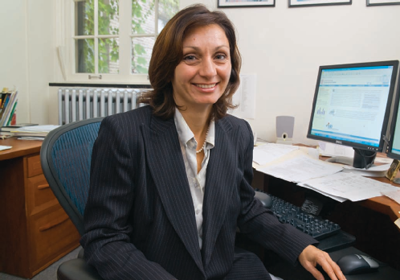Inside Cornell's academic polling unit
Inside Cornell's academic polling unit
Want to know if New Yorkers support a tax on junk food? Curious about attitudes toward immigrants? Wondering if Americans are happy in their jobs? Cornell's Survey Research Institute (SRI) has the answers to those questions, and many more.
Housed in a squat, white cinderblock building on Pine Tree Road that was formerly home to a bovine artificial-insemination company, SRI was founded in 1996 by the ILR school as a fee-for-service unit. Its mission is to support the social sciences at the University; a variety of outside clients, including state governments, corporations, and news organizations, also contract SRI's services.
SRI conducts eighty to 100 projects each year—as many as forty at once, equally divided among phone surveys, Web-based surveys, and a mix of focus groups and paper-scannable surveys. Current and past projects include a study of unemployed workers in New Jersey, for Princeton University; a public opinion poll on the restoration of wolves to the Adirondack Park, for the New York State Department of Environmental Conservation; and a survey of undergrads during the 2008 presidential election, for CBS News.
SRI also conducts annual omnibus surveys, which contain questions on a variety of topics. The Empire State Poll, which comprises a random sample of 800 New York residents, allows researchers to submit questions for a fee ($700 for a close-ended question, $1,100 for an open-ended one). Questions range from work-place, community, and government topics to economics, media issues, and current events. The Cornell National Social Survey (CNSS) gives researchers a chance to collect data from 1,000 Americans, free of charge; topics covered in the 2008 poll included weekly spending on gasoline, consumer-related disputes, community group involvement, and attitudes toward Muslim women who wear headscarves. Last summer, SRI teamed with the New York Times and TV station NY1 to survey New Yorkers on a variety of topics including obesity, the economy, and gay marriage. Questions were contributed by Cornell faculty as well as Times pollsters, with the results reported in a series of news articles in June.

SRI gets its lists of phone numbers from several sources, including a Philadelphia company that sells randomly generated lists of land lines, cell-phone numbers, and addresses; the marketing firm Dun & Bradstreet is a common source for business or organizational surveys. SRI has a full-time staff of seven, plus another sixty to eighty interviewers—a mix of undergrads, grad students, and locals— who are called in as needed. For the Times poll, the twenty-two workstations in the SRI "boiler room" were filled for five days straight. Says SRI director Yasamin Miller: "It can get hectic in there."
Seth Carl, who has worked as an SRI interviewer for more than two years, notes that a bustling atmosphere contributes to better morale among the interviewers, especially when there are thousands of calls to make. "When it's just one person calling, you have to deal with all the hang-ups, people not wanting to talk, bad phone numbers, etcetera, all by yourself," he says. "When you have more folks to filter out those calls, it keeps you from getting burned out." In the age of voicemail, Caller ID, and cell phones—not to mention spam and solicitation calls— it's not easy to get a willing participant on the phone. The CNSS, for example, required more than 15,000 calls to yield 1,000 useful responses. "You can spend an hour dialing numbers before you get that one person, but you can't sound desperate or they'll hang up on you," Miller notes. "The trick is to develop a relationship in the first ten seconds, so that person is completely at ease with you."
Who makes the best interviewer? "It's the person who has a keen interest in people and is curious about research," Miller says. "We first thought people with extroverted personalities would be great, but they can be so intent on saying hello that they're not as focused on the quality of the data. We have a lot of students who are bright and understand research and the importance of accurate data." Still, she says, survey work can make for a tense environment. "Our clients have agreed to a budget, and we have to complete our work within a certain timeline— and we've got forty of these projects going on," Miller says. "But we've been doing this a long time, and we're used to the pressure."
— Jim Catalano
{mp4remote}http://www.cornell.edu/mediavolume/events/2009/20090121-lying-on-surveys.mp4{/mp4remote}
CornellCast video:
How Do You Know if People are Lying on a Survey? (1:32:05)


